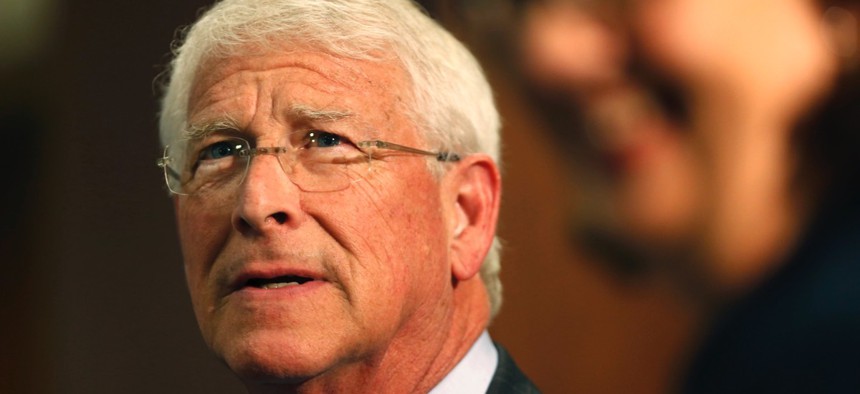Republican Senator Says Infrastructure Proponents Need to Be Realistic

U.S. Sen. Roger Wicker Amel Emric / AP Photo
“We can do little reauthorizations within the current constraints, but to do something big we’d have to fess up and agree that you have to pay for things,” said U.S. Sen. Roger Wicker, chairman of the Senate Commerce Committee.
WASHINGTON — The Republican chairman of a key Senate committee on Wednesday called for “realism” from both parties about the possibility of passing a sweeping infrastructure package this year.
After an infrastructure hearing at the Senate Commerce Committee featuring testimony from transportation industry representatives, U.S. Sen. Roger Wicker of Mississippi told reporters questions about increasing the federal gas tax and indexing it to inflation “ought to be asked.”
Wicker said Republican-backed tax reform passed in 2017 increases the likelihood there is enough economic growth to fund an infrastructure bill, but he wasn’t sure one will materialize in 2019.
“I don’t know, but there’s going to have to be some realism on both sides of the aisle about how to pay for it,” Wicker said. “We can do little reauthorizations within the current constraints, but to do something big we’d have to fess up and agree that you have to pay for things.”
Representatives from the American Association of Port Authorities, Association of American Railroads, American Trucking Association, and Transportation Trades Department all urged senators to support increasing the gas tax to some degree.
Trucking accounts for four percent of vehicles on U.S. highways but funds nearly half of the Highway Trust Fund, and still truckers are willing to pay “a modest increase” in the price of fuel, said Chris Spear, president and CEO of the ATA.
ATA’s Build America Fund proposal would see the gas tax increase 5 cents a year for four years, from 18.4 cents per gallon to 38.4 cents, raising an estimated $340 billion over the next decade.
Spear called the Build America Fund the “most conservative proposal” to generate real funding. Asset recycling and public-private partnerships—code for tolling from a trucking perspective— constitute “fake funding,” he added.
“Federal inaction has prompted cash-strapped states to adopt regressive revenue schemes that hurt commuters, communities and divert funds to non-infrastructure priorities,” Spear said.
Ian Jefferies, president and CEO of the railroad association, additionally supported indexing the gas tax to inflation when asked by Wicker.
“We wouldn’t be having this discussion right now if it had been done in [19]93,” Jefferies said.
The federal gas tax was last increased in 1993.
Republican U.S. Sens. Cory Gardner of Colorado and Mike Lee of Utah wanted to know what other sources or revenue, aside from increasing the gas tax, could be used to fund highways.
Lee worried increasing the gas tax would have an outsized effect on poor and middle-class Americans, especially those in rural America who can’t afford alternative vehicles and drive further on average.
“We ought to look for ways that don’t involve raising taxes for families,” Lee said, suggesting possibly cutting government spending.
Spear said a 20-cent gas tax increase would cost the average family an extra $100 a year, when motorists already spend an average of $1,600 a year on vehicle repairs and 155 hours idling in traffic because of the poor quality of U.S. infrastructure.
“There’s your offset,” he said.
The idea of Congress pushing a major infrastructure package has received renewed focus in Washington in the past few weeks, with local and state lawmakers lobbying for funding and both Democrats and Republicans saying they like the idea of working on the issue.
But whether the two parties in Congress, along with President Trump, could actually agree on a framework has been less clear. A key issue would be agreeing how to pay for any plan.
Over the long term, AAPA and AAR back slowly moving to a user-based system, vehicle miles traveled, that accounts for all drivers on highways including owners of hybrid and electric vehicles. Spear said truckers were open to having a dialogue within the next decade about VMT.
The trucking industry estimates between $120 billion and $150 billion is needed for highways in the next decade, while the American Cable Association hasn’t put an exact number on how much money it needs to extend broadband internet service to rural America. But ACA members have already invested about $10 billion deploying broadband in remote areas, said Matthew Polka, president and CEO of the association.
“Those numbers are very important if we’re going to move forward in these particular areas,” said U.S. Sen. Jon Tester, a Montana Democrat.
U.S. Sen. Maria Cantwell of Washington State, the ranking Democrat on the committee, said Congress needs to put forth an infrastructure proposal that focuses on return on investment.
Seattle has the sixth-worst congestion and Washington state six of the 10 worst bottlenecks for trucking in the nation, she added.
“We lose our competitiveness to other nations, who might be able to move those products faster,” Cantwell said.
Reauthorization of expiring infrastructure legislation might be doable this year, Wicker said, noting that the Fixing America’s Surface Transportation Act expires in 2020.
“I have discovered this through testimony, that there’s no magic dust and no alchemy available to us to fund infrastructure,” Wicker said. “Generally the people who build it, at the end of the day, like to be paid.”
Dave Nyczepir is a News Editor at Route Fifty and is based in Washington, D.C.
NEXT STORY: Start modernization projects with unified communications






